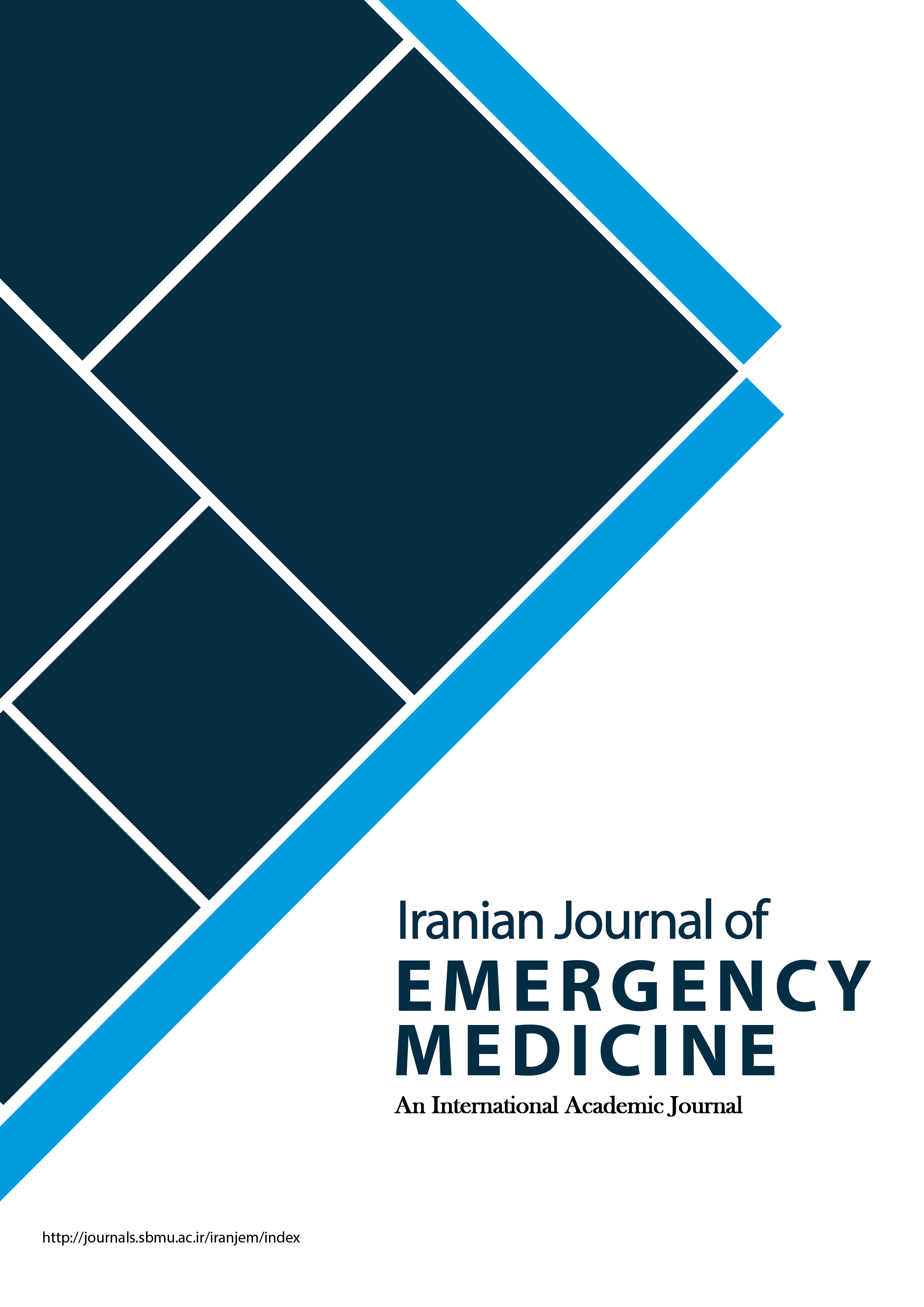Assessing Nurses’ Knowledge in the Face of Nuclear Accidents
Iranian Journal of Emergency Medicine,
Vol. 4 No. 1 (2017),
21 December 2016
,
Page 26-20
https://doi.org/10.22037/ijem.v4i1.14497
Abstract
Introduction: Nuclear accidents in any shape or anywhere require presence of trained individuals and medical teams on the site of accident. Considering the important role of nurses in efficient management of these disasters, they should possess special qualifications in different areas. This study was done with the aim of assessing the knowledge of nurses working at a military hospital in the face of nuclear accidents. Methods: This Cross-sectional descriptive study was carried out in 2015 in a military hospital. The study population consisted of nursing staff of the hospital, which were included using consecutive sampling. The tool used for this study was a questionnaire consisting of 2 parts. The first part was about the demographic data of the participants and the second part had 14 questions for evaluating the knowledge of the participants on facing nuclear accidents. Gathered data were analyzed using SPSS version 17 and descriptive statistics methods such as t-test and ANOVA. Results: In this study, 136 of the nursing staff with the mean age of 32.99 ± 4.56 years participated (76.5% female). 83.8% had a Bachelor’s degree and their mean work experience was 8.03 ± 3.86 years, while 76.5% of them had no history of presence or service in any accident or disaster. Only 5.8% of the participants had sufficient knowledge of consequences of a nuclear accident and 80.3% of them had not participated in any training courses regarding nuclear victims. Knowledge of the nurses was evaluated as poor (m = 25) and results showed that there is no significant correlation between work experience (p = 0.330) and type of ward (p = 0.718) with the knowledge of nurses on encountering nuclear accidents. Conclusion:Knowledge of nurses in facing nuclear accidents was poor and hospitals need to design disaster management programs and review its details with the staff in the form of trainings and maneuvers. In addition, decision-makers of educational programs for nursing students should include the topics related to nuclear disaster management and prepare the graduates for facing these accidents.- آگاهی؛ پرستاران؛ انتشار موارد رادیواکتیو؛ بیمارستان ها
How to Cite
References
Yazdanian A, Habibiyan H. Liable to compensate the damages caused by nuclear accidents in international conventions and the rights of Iran. Journal of Legal Studies of Shiraz University 2014;6(2):155-86.
Gralla F, Abson DJ, Møller AP, Lang DJ, von Wehrden H. The impact of nuclear accidents on provisioning ecosystem services. Ecological Indicators. 2014;41:1-14.
Yin H, He H, Arbon P, Zhu J. A survey of the practice of nurses’ skills in Wenchuan earthquake disaster sites: implications for disaster training. Journal of advanced nursing. 2011;67(10):2231-8.
Ameryoun A, Sadeghi AA, Aghighi A. A survey on awareness of health staff in the face of nuclear accidents at military hospitals. Ebnesina 2014;16(3):18-23.
Baniyaghoobi F, Aliyari S, Sharififar S, Pishgooie A. Radiation accidents and how to deal with it. 2. 2014;1(1):43-51.
Shahabinejad M, Zarnaqi BN, Zaboli R, Khalilifar O. Assessment of clinical skills of nurses in crisis handling in military hospitals. Ebnesina 2016;17(4):52-8.
Veenema TG, Griffin A, Gable AR, MacIntyre L, Simons R, Couig MP, et al. Nurses as Leaders in Disaster Preparedness and Response—A Call to Action. Journal of Nursing Scholarship. 2016;48(2):187-200.
Tzeng W-C, Feng H-P, Cheng W-T, Lin C-H, Chiang L-C, Pai L, et al. Readiness of hospital nurses for disaster responses in Taiwan: A cross-sectional study. Nurse education today. 2016;46(1).
Schultz CH, Koenig KL, Whiteside M, Murray R, Force NSA-HDCCT. Development of national standardized all-hazard disaster core competencies for acute care physicians, nurses, and EMS professionals. Annals of emergency medicine. 2012;59(3):196-208. e1.
Societies IFoRCaRC. Nuclear and Radiological Emergency Guidelines: Preparedness,Response and Recovery. Geneva: IFRC; 2015. p. 112.
Monfared AS. Nuclear Weapons, Triage of Injured and Therapeetic Approach to the Acute Radiation Syndrome. Journal Of Army University Of Medical Sciences Of The IRIran. 2004;2(8):463-8.
Weiner E, Irwin M, Trangenstein P, Gordon J. Emergency preparedness curriculum in nursing schools in the United States. Nursing Education Perspectives. 2005;26(6):334-9.
Chapman K, Arbon P. Are nurses ready?: Disaster preparedness in the acute setting. Australasian Emergency Nursing Journal. 2008;11(3):135-44.
Hoseini A, Musarezaie A, Eslamian J. Awareness of Radiological Accidents and How to Deal with It: A Study of Nurses and Nursing Faculties of Isfahan University of Medical Sciences. Iranian Journal of Medical Education. 2014;14(1):78-86.
Kitamiya C, Kurauchi S, Kidachi R, Araki H. Exploratory study on the preparation required for public health nurses responding to a radiation accident. Radiation Emergency Medicine. 2012;1(1-2):84-7.
Labrague LJ, Yboa BC, McEnroe–Petitte DM, Lobrino LR, Brennan MGB. Disaster preparedness in Philippine nurses. Journal of nursing scholarship. 2016;48(1):98-105.
Nouri JM, Khademolhosseini SM, Ebadi A, Moradi E. Effectiveness of lecture method on’ nurses`s learning levels in nursing education in nuclear education Nursing Management. 2012;1(2):29-36.
Aliakbari F, Bahrami M, Aein F, Khankeh H. Iranian nurses’ experience of essential technical competences in disaster response: A qualitative content analysis study. Iranian journal of nursing and midwifery research. 2014;19(6):585-92.
Ohtsuru A, Tanigawa K, Kumagai A, Niwa O, Takamura N, Midorikawa S, et al. Nuclear disasters and health: lessons learned, challenges, and proposals. The Lancet. 2015;386(9992):489-97.
Veenema TG, Thornton CP. Guidance in managing patients following radiation events. Advanced emergency nursing journal. 2015;37(3):197-208.
Delshad H, Azizi F. Health Risk of Nuclear- Power- plant Accidents on Thyroid Gland and Human Health. Iranian Journal of Endocrinology and Metabolism. 2013;14(6):586-96.
Okuda H, Kunugita N, Miyata R. The role in supporting activities of the public health nurses at the time of a radiation disaster. Hoken Iryo Kagaku. 2013;62(2):163-71.
Noto Y, Kitamiya C, Itaki C, Urushizaka M, Kidachi R, Yamabe H. Role of nurses in a nuclear disaster: experience in the Fukushima Dai‐ichi nuclear power plant accident. International nursing review. 2013;60(2):196-200.
- Abstract Viewed: 306 times
- PDF (فارسی) Downloaded: 153 times
- HTML (فارسی) Downloaded: 76 times



